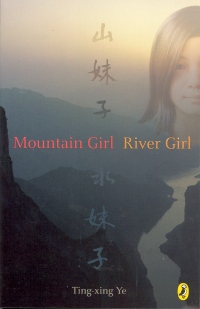| ________________
CM . . .
. Volume XV Number 6. . . .November 7, 2008 
 |
Mountain Girl, River Girl.
Ting-xing Ye.
Toronto, ON: Puffin Canada, 2008.
213 pp., pbk., $14.00.
ISBN 978-0-14-316812-6.
Subject Headings:
China-Social conditions-21st century-Juvenile fiction.
Rural-Urban migration-China-Juvenile fiction.
Grades 7-10 / Ages 12-15.
Review by Ann Ketcheson.
***½ /4
|
| |
|

excerpt:
As the last of the passengers rushed to take their seats, Lao Zhou stood on his toes on the platform so he was at eye level with Pan-pan and Shui-lian, who had taken seats next to an open window. He lowered his voice, giving them his final advice. "Look out for yourself and for each other when you are there. Watch what you say, and stay out of trouble. China may still call itself a socialist country, ruled by the Communist Party, but it's capitalism inside the factory walls. Remember: When you live in someone else's house, bend your head if the ceiling is lower than what you're used to."
His last words released a gush of homesickness in Shui-lian. Her mother had often used the same saying. For the past two days, ever since she had left Jim-lin and the other women at the inn, she had been up with the rising sun, walking and begging all day, sleeping in shabby hostels, where she paid three yuan a night for a top bunk. For two days she had thought about nothing but her destination – Shanghai – and starting a new life there. It had been hard to keep her mind off her mother and her family, the rivers and mountains of Sichuan, but she knew she had to, otherwise her will might soften, and she might break down right in the middle of the road and give up her plan.
As the bus rumbled out of the station, Shui-lian wondered where Jin-lin was. She found herself choked with emotions she thought she had lost forever after that horrible night. Quickly she turned her head aside, away from the window. She didn't want Pan-pan to see her tears.
Two young Chinese girls decide to leave their rural homes in hopes of finding work and a promising future in either Beijing or Shanghai. Pan-pan departs from her mountain village with nothing more than a few clothes and some cash and doesn't get very far before everything is stolen from her. Shui-lian trusts the man who offers her a job interview, only to end up with a group of other women whose ultimate fate is to be forced into marriage with total strangers. By chance, the two girls meet one another and decide to take jobs in a factory which manufactures shoes. When Shui-lan is forced to quit because of an injury, Pan-pan chooses to support her friend and leave as well. Eventually the pair arrives in Beijing where they ultimately meet Sun Ming, the woman Pan-pan was supposed to contact if ever she needed help.
Ting-xing Ye was born in Shanghai and lived in China for 35 years before coming to Canada. Her descriptions of both the countryside and the urban environment are detailed and insightful and help readers see many sides of China and Chinese society. Particularly interesting – and devastating – are her descriptions of the sweatshop where the girls form part of a human machine which produces thousands of running shoes for export to North America. Each worker is expected to finish at least 20 shoes per shift, shoes that no one in the factory could ever afford to buy. Ye is able to take her readers into the heat and noise of the factory as well as into the unbelievable living conditions in the workers' dormitory.
The two girls have wonderful dreams about their new life in the city and yet face enormous challenges which quickly change their dreams to nightmares. Despite this, their friendship remains strong, and there is a bond which one feels will last a lifetime. This is a coming-of-age novel but one set in the unique setting of China. Ye paints a picture of greed and crime, and some readers may be shocked by some of the practices that apparently continue in modern-day China. However, she also includes characters who show a kinder, gentler society. There are even flashes of humour. For example, the girls are amazed by the first escalator they have ever seen and so go up and down several times, surprised that they don't have to pay for this ride.
Despite cultural differences, young Canadian readers will relate to Pan-pan and Shui-lian because the desires of adolescents to leave home and 'find themselves' are common to all of us. The recent Olympic Games in Beijing may also encourage teens to pick up this novel. Those who read the book will enjoy all kinds of adventures in an exotic setting. The plot turns on a couple of coincidences that are just a little too convenient, but despite this slight criticism Mountain Girl, River Girl is a fine novel about a special bond of friendship which overcomes all kinds of difficulties.
Recommended.
Ann Ketcheson, a retired teacher-librarian and teacher of high school English and French, lives in Ottawa, ON, where she has turned her love of travel into a new career as a travel consultant.

To comment
on this title or this review, send mail to cm@umanitoba.ca.
Copyright © the Manitoba Library Association. Reproduction for personal
use is permitted only if this copyright notice is maintained. Any
other reproduction is prohibited without permission.
NEXT REVIEW |
TABLE OF CONTENTS FOR THIS ISSUE
- November 7, 2008.
AUTHORS |
TITLES |
MEDIA REVIEWS |
PROFILES |
BACK ISSUES |
SEARCH |
CMARCHIVE |
HOME |
